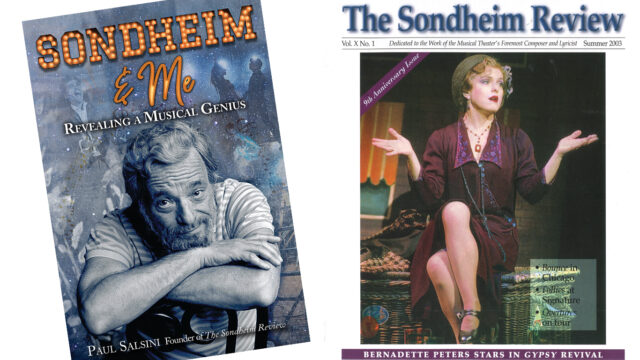A political reporter by trade, Paul Salsini parlayed a fascination with one of America’s great musical minds into a long-running newsletter and now a book.
Paul Salsini was a journalistic mainstay in Milwaukee for decades, serving as a reporter and editor for The Milwaukee Journal for 37 years and as the Wisconsin correspondent for The New York Times for 15. While his coverage gravitated toward government and politics, he nurtured a longtime fascination with one of the greatest musical writers of all time: Stephen Sondheim.

Not satisfied with admiring the maestro’s work from afar, Salsini reached out to him in 1984 and was surprised by the warmth of the response. Years of research and personal exchanges inspired Salsini to publish a magazine about Sondheim during the latter portion of the artist’s career and a book after his death: “Sondheim and Me: Revealing a Musical Genius.”
In recent years, Salsini has turned his attention to fiction, penning a series of 10 books set in Tuscany, including the award-winning “The Cielo: A Novel of Wartime Tuscany.”
Did you know that Sondheim wrote a musical set in Italy? Salsini does, and he’s happy to talk about it, as well as his long and occasionally fraught relationship with the artist.
Fra Noi: Your book on Sondheim represents a dramatic departure from the topics you’ve tackled as a journalist and novelist. Please explain the shift.
Paul Salsini: I guess you might say I have varied interests. I’d always been interested in musical theater and fell in love with Sondheim’s works when I saw his “Follies” in 1972 on Broadway. It was an amazing show, with so many layers. On the surface, it was the story of two couples who return to New York for a reunion of showgirls. But it was much more than that. It was the story of love and loss, past and present, failure and redemption, youth and aging. In short, it was about the follies of our lives.
FN: Why is Sondheim important?
PS: I’ll just quote from his obits: “His music and lyrics raised and reset the artistic standard for the American stage musical.” “He reinvented the American musical.” His music and lyrics have “unprecedented complexity and sophistication.” His shows address the “darker, more harrowing elements of the human experience.”
He was a genius but with works that are accessible and enjoyable.
FN: How did your relationship with Sondheim start?
PS: After seeing “Follies,” I became kind of obsessive. I amassed a huge collection of books, articles, tapes, LP records, CDs and DVDs, programs and a lot more. I went to New York to see his new shows. In 1984, I became interested in a show called “Saturday Night,” which would have been Sondheim’s first show on Broadway (at age 25), but the producer died and it was never produced. So I found Sondheim’s address and wrote him with some questions about it. To my amazement, he not only replied, but also sent a very rare cassette tape with the songs from a backers’ audition. I was floored. He sent this to a person he’d never heard of in Milwaukee, Wisconsin?
After that, I wrote him a few more times about his earlier works, and he even sent me sheet music for some of them. It was amazing.
FN: Tell us about The Sondheim Review.
PS: I had become somewhat of an authority on Sondheim and thought at first about writing a book about his works, but realized I didn’t have the time or resources. I was familiar with a newsletter about the composer Kurt Weill (another of my favorites) and thought, “If a dead composer could have a newsletter, why couldn’t the greatest living composer/lyricist have one? I’m a journalist. I can do that.” So I gathered a staff, found someone to take care of the business side, rallied a designer and a printer, and published the first issue of The Sondheim Review in June 1994. Along the way, that “newsletter” became a slick magazine.
FN: What was the relationship like?
PS: Because The Sondheim Review was unique, I’m not sure that Sondheim knew what to expect, though I told him it would not be a “fanzine” but a journalistic resource of news, interviews, reviews, articles, essays, etc. I think he soon learned to respect it because after every issue, at least at the start, he would send me notes mentioning specific articles and correcting what I thought were minor errors. We also talked a lot on the phone, and it was fun for me to listen as he got excited about a new show he was writing.
FN: Was it always cordial?
PS: Almost always, but there was a major blowup over our review of the London production of “Passion.” I thought it was a fair, if strong, review, but Sondheim thought otherwise. He called and literally ranted, saying it was unfair, that we shouldn’t have run it, that the reviewer didn’t know anything about musical theater. (The reviewer was a well-known director of musical theater). Then, he followed that with a note that libeled the reviewer. A few weeks later, he called again, but his rant wasn’t as strong that time. Then, he dropped the subject, and we continued our relationship as if it never happened. I’m still baffled to this day about the whole episode.
FN: “Passion” was set in Italy, wasn’t it?
PS: It was his last new show on Broadway. It debuted in 1994, and it was set in Milan. It was inspired by Ettore Scola’s film “Passione d’Amore” and Igninio Ugo Tarchetti’s 1869 novel “Fosca.” It’s a dark story, about a plain woman who falls in love with a young soldier who is already having an affair with a beautiful married woman. That noted authority Wikipedia says that its central themes include “love, sex, obsession, illness, passion, beauty, power and manipulation.” Well, perhaps, but it’s mostly a tale about the power of obsessive love.
FN: How did your book about Sondheim come about?
PS: I found a publisher and started writing like mad. I used excerpts from articles from the magazine, plus his notes. The publisher added a 64-page insert with lots of photos, handwritten lyrics, posters, covers, etc., and there’s an extensive chronology.
FN: What has the response been like?
PS: Very positive. It got notices in The New York Times, The Washington Post, NPR, the BBC, the AP and numerous other publications. People say it reveals a human side of a genius they hadn’t known before.
FN: What compelled you to write about Tuscany?
PS: It’s the land of my roots. My cousin told me how during World War II, the Nazis invaded her little village, and everyone had to flee. She and some friends hovered in an abandoned farmhouse in the hills for three months while the war went on all around them. I thought his was a fascinating story, but I didn’t have the time or the resources to write it as nonfiction. So I wrote it as a novel — the first fiction I’d ever written — and the rest, as they say, is history.
The above appears in the May 2023 issue of the print version of Fra Noi. Our gorgeous, monthly magazine contains a veritable feast of news and views, profiles and features, entertainment and culture. To subscribe, click here.
 Fra Noi Embrace Your Inner Italian
Fra Noi Embrace Your Inner Italian







